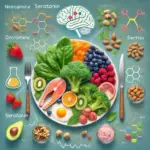Nutrition plays a crucial role in our overall health and well-being, yet its importance varies significantly across different life stages. Understanding nutritional needs is essential for both children and adults, as these needs shift from the rapid growth and development required in childhood to the maintenance of health and prevention of disease in adulthood. In this article, we will explore how dietary requirements differ between these two pivotal periods of life, helping you navigate the complex world of nutrition and ensure that you and your loved ones are making informed dietary choices. Discover the key nutrients essential for growth in children and the vital components that support long-term health in adults, allowing you to optimize nutrition throughout life stages.
The Importance of Nutrition
Impact on Growth and Development
Proper nutrition is crucial for the physical and mental development of children. Nutrients play significant roles in various aspects of growth, including bone health, cognitive function, and energy levels. For instance, calcium is essential for developing strong bones, while iron is important for cognitive development and energy metabolism.
Key nutrients needed during childhood include:
- Calcium: Vital for bone strength and density.
- Iron: Crucial for transporting oxygen in the blood and supporting cognitive function.
- Protein: Supports overall growth and tissue repair.
Long-term Health Benefits
The nutritional choices made during childhood can set the foundation for lifelong health. Early nutrition plays a pivotal role in preventing chronic diseases such as obesity, diabetes, and heart disease later in life. Research indicates that children who maintain a balanced diet rich in essential nutrients are more likely to develop healthier habits as adults, reducing their risk for chronic illnesses and improving overall well-being.
Nutritional Needs in Childhood
Macronutrients for Growth
Proper nutrition during childhood is crucial for growth and development. The three primary macronutrients—proteins, carbohydrates, and fats—play essential roles in a child’s health.
- Proteins: Essential for building and repairing tissues. Sources include lean meats, dairy products, legumes, and nuts.
- Carbohydrates: The body’s main energy source. Whole grains, fruits, and vegetables should be prioritized for overall health.
- Fats: Important for brain development and absorption of vitamins. Healthy fats from sources like avocados, olive oil, and fish are vital for growing children.
Micronutrients Role
Micronutrients are equally important in promoting optimal health in children. Key vitamins and minerals must be included in their diets to support various bodily functions.
- Vitamin D: Crucial for calcium absorption and bone health, found in fortified dairy products, fatty fish, and sunlight exposure.
- B Vitamins: Necessary for energy conversion and red blood cell production. Whole grains, eggs, and green leafy vegetables are excellent sources.
Special Considerations
Children often face unique dietary considerations that must be taken into account for effective nutrition.
- Food Allergies and Intolerances: Parents should be aware of common allergens (such as nuts, dairy, and gluten) and seek alternatives to ensure a balanced diet.
- Variety in Diet: Encouraging a wide range of foods helps prevent picky eating and ensures children receive necessary nutrients for growth and development.
Nutritional Needs in Adulthood
Maintaining Energy Balance
In adulthood, maintaining energy balance is crucial for overall health. Caloric needs fluctuate based on factors such as age, gender, and activity level. Individuals with higher activity levels require more calories to sustain energy, while those with sedentary lifestyles need fewer.
Micro and Macronutrient Requirements
As adults age, the focus shifts towards ensuring a balanced intake of macronutrients and micronutrients. Essential macronutrients include:
- Proteins: Important for muscle maintenance and repair.
- Carbohydrates: Provide energy, with an emphasis on whole grains and fiber.
- Fats: Healthy fats, such as those found in avocados and olive oil, contribute to heart health.
Micronutrients also play a vital role in adult nutrition. Key nutrients include:
- Fiber: Supports digestive health and helps prevent chronic diseases.
- Antioxidants: Found in fruits and vegetables, these compounds help combat oxidative stress.
Preventative Nutrition
Preventative nutrition is essential for reducing the risk of age-related health conditions. Key dietary strategies include:
- Consuming a diet rich in fruits, vegetables, whole grains, and lean proteins to support cardiovascular health and weight management.
- Monitoring sugar and salt intake to prevent hypertension and diabetes.
By focusing on these nutritional principles, adults can significantly enhance their quality of life and longevity.
Comparative Analysis
Key Differences in Nutritional Requirements
Understanding the nutritional needs of children and adults reveals significant differences that stem from their unique developmental stages.
- Children’s Nutritional Needs:
- During childhood, there is a higher demand for certain nutrients to support rapid growth and development. For instance, calcium is critical for bone development, and iron is essential for cognitive development and preventing anemia.
- Adults’ Nutritional Needs:
- In contrast, adults require adequate protein to maintain muscle mass and strength, particularly as they age. Healthy fats and antioxidants become increasingly important to combat oxidative stress and support heart health.
Dietary Guidelines for Each Stage
Nutritional guidelines vary significantly from childhood to adulthood, reflecting the specific needs at each life stage.
- Recommended Daily Allowances (RDAs) for Children:
- Children aged 1-3:
- Calcium: 700 mg
- Iron: 7 mg
- Children aged 4-8:
- Calcium: 1,000 mg
- Iron: 10 mg
- Children aged 1-3:
- Recommended Daily Allowances (RDAs) for Adults:
- Adults aged 19-50:
- Calcium: 1,000 mg
- Iron: 8 mg (for men) / 18 mg (for women)
- Adults aged 19-50:
By recognizing these differences, caregivers and nutritionists can better tailor dietary advice to meet the unique needs of children and adults, ensuring optimal health and development across life stages.
Challenges in Nutrition Across Stages
Barriers to Healthy Eating
Both children and adults face unique challenges that can hinder their ability to maintain a healthy diet.
- Children’s Challenges:
- Picky eating is a common issue, where children often refuse nutritious foods in favor of snacks and fast food. Implementing a variety of choices at meals can help introduce new tastes.
- The influence of peer pressure during school meals can lead to unhealthy choices as children may opt for processed snacks over fruit and vegetables.
- Adults’ Challenges:
- Time constraints often lead adults to choose convenience foods that are high in sodium, sugar, and unhealthy fats instead of cooking balanced meals.
- Stressful lifestyles may drive individuals towards emotional eating or reliance on fast food, making it difficult to maintain a nutritious diet.
Socioeconomic Factors
Income and education levels play a significant role in shaping dietary habits across different age groups.
- Access to Healthy Foods:
- Families with lower income often find it challenging to purchase fresh fruits and vegetables, leading to a reliance on cheaper, processed foods that lack essential nutrients.
- Knowledge about nutrition and cooking skills can greatly influence an individual’s ability to prepare healthy meals, with education often correlating with better dietary choices.
- Community Initiatives:
- Communities can implement programs to enhance access to nutritious foods, including farmer’s markets and food education workshops aimed at both children and adults, ensuring a broader understanding of healthy eating practices.
- Role of Family and Environment:
- Influence of Family Meals:
- Structured meal times promote healthy eating habits. Family meals create opportunities for children to learn about nutrition and enjoy a variety of foods together. Positive family dynamics can enhance children’s willingness to try new foods and develop a healthy relationship with food.
- Creating Healthy Environments:
- Strategies to foster healthy eating habits include stocking the pantry with nutritious options, involving children in meal preparation, and setting examples through healthy choices made by adults. Additionally, creating a positive mealtime atmosphere can encourage both children and adults to engage in mindful eating practices.
- Influence of Family Meals:
Implementing Change:
Practical Tips for Parents and Adults:
- Meal Planning:
- Create a weekly menu that includes a variety of foods to ensure balanced nutrition for both children and adults.
- Involve children in the planning process to increase their interest in healthy foods.
- Healthy Food Choices:
- Stock the pantry with nutritious snacks like fruits, nuts, and whole-grain products.
- Choose lean protein sources, such as chicken, fish, legumes, and low-fat dairy for meals.
Encouraging Lifelong Healthy Habits:
- Start Early:
- Introduce fruits and vegetables at a young age to develop a taste for healthy foods.
- Make mealtime a fun and engaging experience to promote positive associations with eating.
-
Adapt to Life Stages:
- Regularly reassess dietary needs as children grow and adults age, adjusting portions and food types accordingly.
- Encourage physical activity alongside healthy eating to reinforce the connection between diet and a healthy lifestyle.
In conclusion, we explored the vital differences in nutritional needs between children and adults, emphasizing the distinct requirements for growth and development in childhood, alongside the focus on maintenance and prevention in adulthood. Understanding the key macronutrients and micronutrients needed at each stage of life is crucial for fostering long-term health. We encourage readers to assess their dietary choices and those of their children, ensuring informed and healthy eating practices that adapt with each life stage. For further exploration on nutrition strategies, feel free to check out our related articles and subscribe to our newsletter for ongoing health tips. Your thoughts and experiences matter to us, so please share any questions or comments below!









